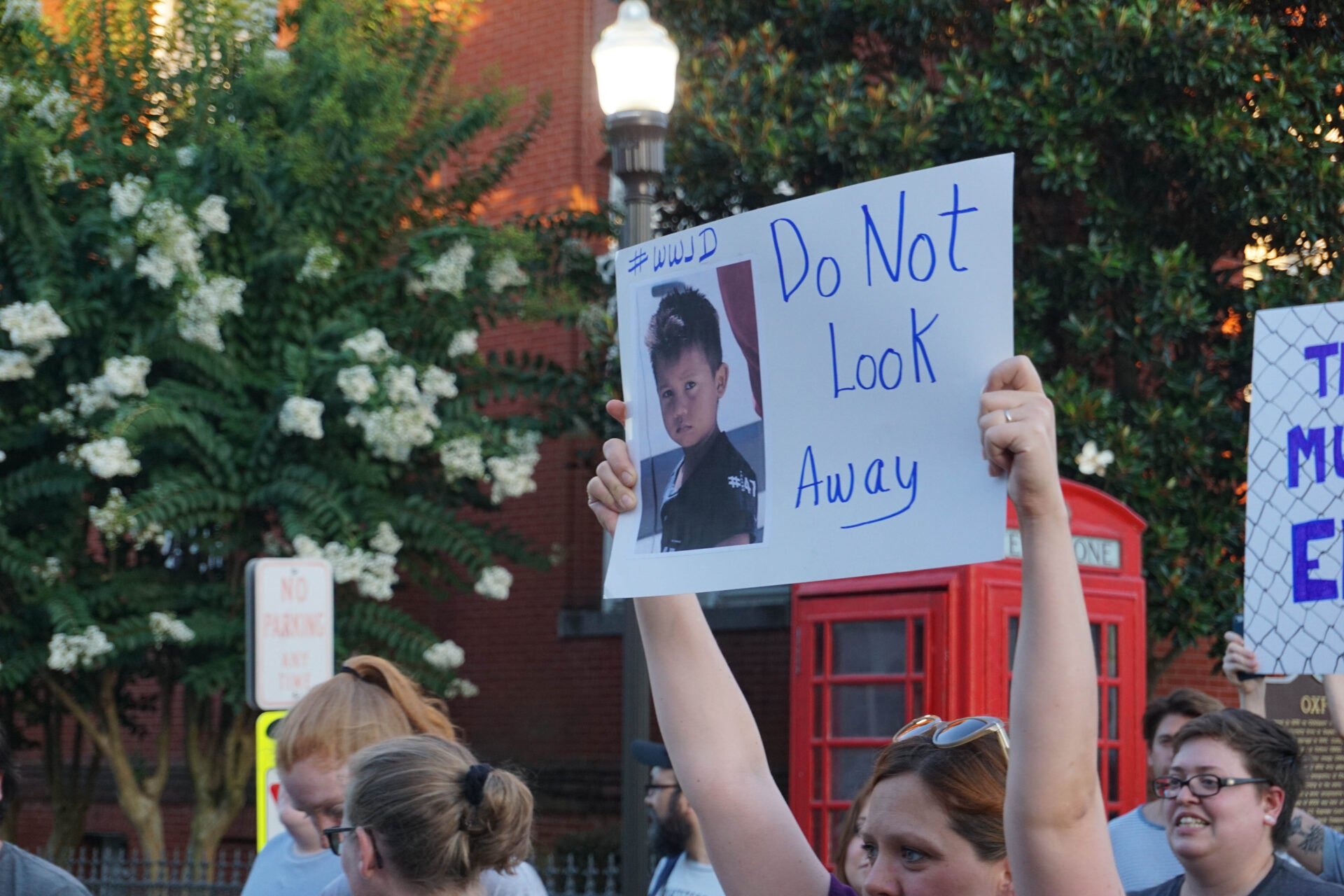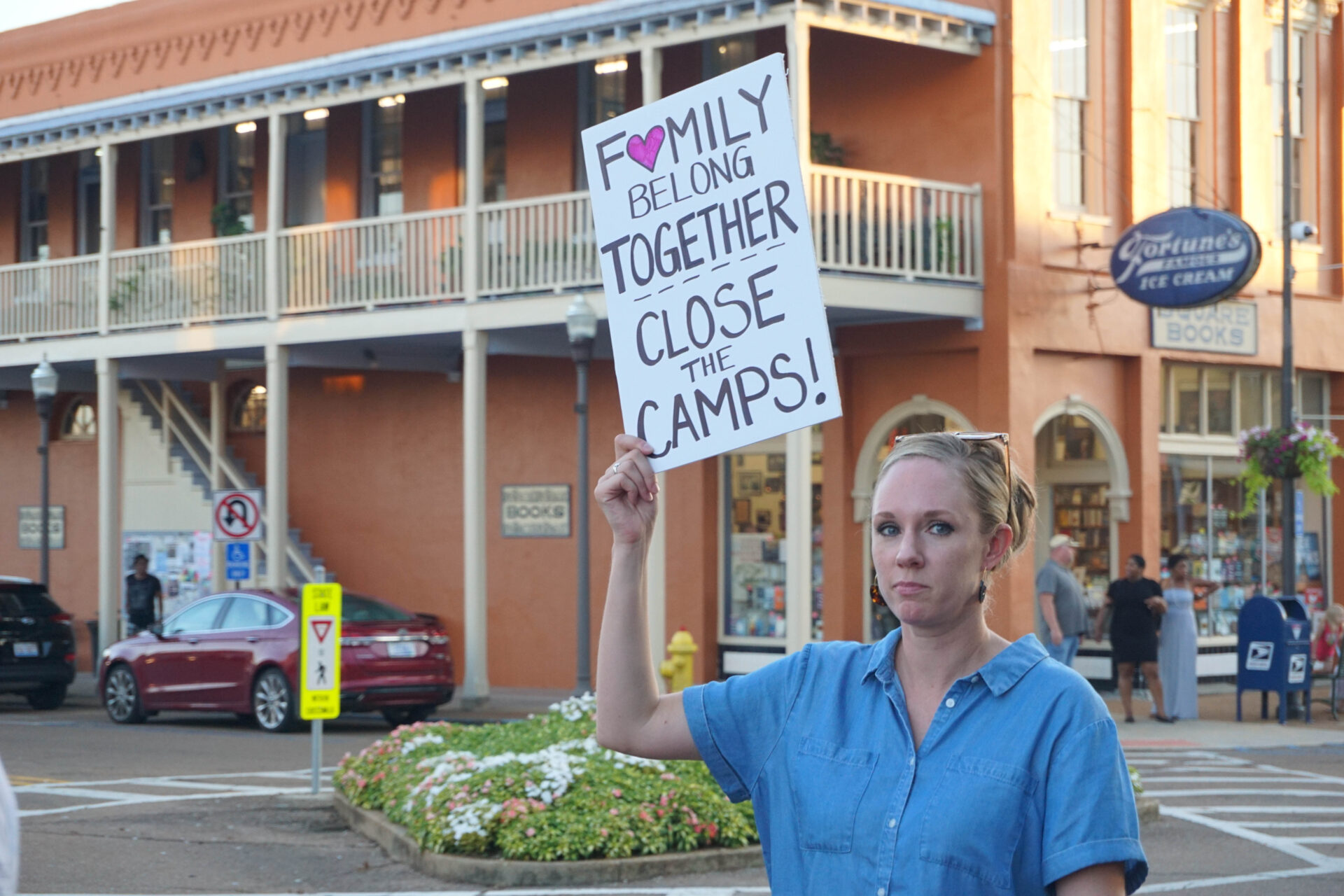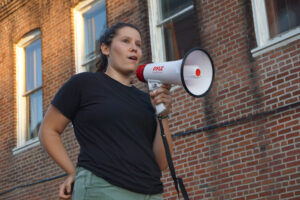By Talbert Toole
Lifestyles Editor
talbert.toole@hottytoddy.com

Immigration policy is an issue that has divided party lines within the U.S. Congress and has human rights activists aiming to destabilize private detention centers along the country’s southern border.
In hopes to continue the conversation and create action against the dehumanizing conditions revealed by journalists and members of Congress, organizations across the country gathered in solidarity Friday night for “Lights for Liberty: A Vigil to End Human Detention Camps”—a nationwide effort to call attention to and end the inhumane conditions happening inside immigration concentration camps across the country.
UM Solidary, a student organization at the University of Mississippi, co-hosted Oxford’s protest with the Unitarian Universalist Congregation of Oxford and Indivisible LOU.
Approximately 75-100 LOU community members gathered on the steps of City Hall at 7:30 p.m. in protest of the conditions of the detention centers at the border.
Signs reading “End U.S. Concentration Camps” and “Do Not Look Away” along with pictures of young children who died in ICE custody filled the Square Friday night, July 12. Over 24 migrants have died in custody under ICE (Immigration and Customs Enforcement), which is a sector under The Department of Homeland Security.
Dinorah Sapp, a lecturer of intensive English and coordinator of Collaboration Development for the IEP, spoke to the crowd on the steps beside City Hall. As a proud Mexican American for 30 years, she said when she was 15-years-old her parents decided to send her to the U.S. Although she was not escaping an oppressive regime or gangs, she was lucky enough to attend a boarding school in Texas. She said what she has in common with those coming to the U.S. now is the fact that both are were seeking better opportunities.
The families Sapp met opened their doors and homes to a newly arrived woman from Mexico and showed compassion and love, she said.
“I saw them welcome all kinds of people,” Sapp said. “They also took care of people less fortunate than I was. It hurts my heart to see children in cages… this is not the country who welcomed me.”
Bianca Martinez, a student of the University of Mississippi and a DACA recipient ((Deferred Action for Childhood Arrivals), also spoke at Friday’s vigil.
Martinez has worked alongside organizations such as Students Against Social Injustice (SASI) to remove the Confederate statue from the campus’ circle.
“I have a very personal connection to this injustice because I came to the U.S. as a child immigrant from Mexico,” Martinez said. ” I cannot help but place my 3-year-old self in the shoes of those little boys and girls.”
She said she and her parents decided to flee the poverty in Mexico with hopes of finding better opportunities in the U.S.
“No one should be punished and detained for wanting to flee the violence and poverty in their country, especially when American policies are to be responsible,” Martinez said.

Camille Calisch, president of UM Solidarity, said the focus of the vigil was to highlight the humanitarian crisis that is also happening regionally within Mississippi.
“It’s the hour to do something,” Calisch said.
According to Mother Jones, a magazine that covers a vast majority of topics that include politics and human rights, thousands of asylum seekers are currently being detained in the Tallahatchie County Correctional Facility in Mississippi.
The facility is a privately owned prison for men and is operated by CivicCore—a company that owns and manages private prisons and detention centers and operates others on a concession basis.
Calisch said these privately owned prisons are making commodities out of people, especially those who are legally seeking asylum.
She said this is not a brand new issue considering the fact that the Obama administration deported more immigrants than the Trump administration; however, the current administration lit a fire under the dehumanization of how the process is done.

“We hope this is the beginning of something locally,” Calisch said. “Under this administration, there has been a lot of inflammations that have been happening at the border.”
Alexandria Ocasio-Cortez (AOC), the U.S. Representative for New York’s 14th congressional district, visited a Florida detention center after the first Democratic debate last month and revealed conditions many detainees were facing, such as a lack of hygiene products and medical access.
James Thomas, UM assistant professor of sociology, helped Calisch organize Friday’s protest. Thomas, who has been an active voice in the LOU community regarding several controversial issues, said people do not belong in the type of conditions that migrant families are facing at this time in the country.
“I believe in basic human rights,” he said. “The conditions in these camps violate basic human rights.”
AOC compared the current detentions centers to concentration camps, which was faced with backlash on both sides of the political aisle drawing comparisons to the Holocaust; however, Thomas, who is of Jewish descent, said there are many parallels that can be drawn between the two.
He said he remembers the very vivid memories of attending his grandmother’s synagogue on Saturdays and witnessing Holocaust concentration camp survivors. One of his grandmother’s close friends was one of the only people in her family to make it out of Poland during the Nazi regime. Although he said one cannot draw comparisons between death camps under said regime and the conditions at the border, one can see the parallels of escalating conditions the country is witnessing at the border.
“Auschwitz didn’t start off as Auschwitz,” he said. “They were not death camps, but you dehumanize people when you strip them of their dignity, when you strip them of their rights.”
According to Thomas, many scholars agree that AOC’s comparison of the detention centers to concentration camps is correct in terms of how society distinguish things. He said there are tendencies among society to worry about drawing comparisons to the Holocaust because it is a unique and special case.
What makes the Holocaust so unique and special is because of how quickly and efficient it was, which led to the extermination of over 6 million plus people.
“I am comfortable making the comparisons and conditions of the [U.S.] camps at this stage,” Thomas said.
Thomas and Calisch are both actively working to continue the fight against the detention centers in Mississippi and across the country. Their movement plans to continue the fight through meetings and action against these centers.
For those who are interested in joining Thomas and Calisch’s effort, visit UM Solidarity’s Facebook page.
